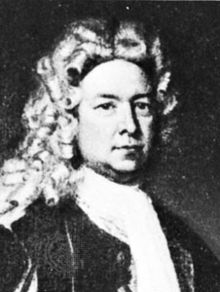Thomas "Diamond" Pitt
| Thomas Pitt | |
|---|---|
 |
|
| President of Fort St George (Madras) | |
|
In office 7 July 1698 – 18 September 1709 |
|
| Preceded by | Nathaniel Higginson |
| Succeeded by | Gulston Addison |
| Personal details | |
| Born | 5 July 1653 Blandford Forum, Dorset, England |
| Died | 28 April 1726 (aged 72) |
| Signature |  |
Thomas "Diamond" Pitt (5 July 1653 – 28 April 1726), born at Blandford Forum, Dorset, to the Reverend John Pitt, a Church of England cleric, and rector of Blandford St Mary, and Sarah Jay, was an English merchant involved in trade with India.
In 1674, Pitt went to India with the East India Company, however he soon began trading for himself as an 'interloper' in defiance of the East India Company's legal monopoly on Indian trade. Upon his return to England he was fined £400 for his actions, although by that time Pitt was already very wealthy and could easily afford the fine. He then proceeded to buy the manor of Stratford and its surrounding borough Old Sarum. With that acquisition he gained a seat in the House of Commons, as that was a rotten borough, although his first seat was as the member for Salisbury in the Convention Parliament of 1689. The purchase of Old Sarum would have a significant effect on English history, as the seat would pass to Pitt's rather influential descendants. Pitt returned to India, and eventually was hired by the East India Company.
In August 1698, Pitt arrived at Madras as the President of the East India Company and was entrusted to negotiate an end to the Child's War with the Mughal Emperor Aurangzeb. Soon in August 1699 he had been appointed as the Governor of Fort St. George, in the year 1702 when the fort itself was besieged by Daud Khan of the Carnatic the Mughal Empire's local Subedar (lieutenant), Thomas Pitt was instructed to vie for peace. He later bought out some of the Carnatic region, he began garrisoning East India Company forts by raising regiments of local Sepoys by hiring from Hindu warrior castes, he armed them with the latest weapons and positioned them under the command of English officers to save Madras, his base of operations from further Mughal harassment.
...
Wikipedia
